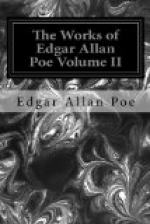P. But of the worm’s metamorphosis we are palpably cognizant.
V. We, certainly — but not the worm. The matter of which our rudimental body is composed, is within the ken of the organs of that body; or, more distinctly, our rudimental organs are adapted to the matter of which is formed the rudimental body; but not to that of which the ultimate is composed. The ultimate body thus escapes our rudimental senses, and we perceive only the shell which falls, in decaying, from the inner form; not that inner form itself; but this inner form, as well as the shell, is appreciable by those who have already acquired the ultimate life.
P. You have often said that the mesmeric state very nearly resembles death. How is this?
V. When I say that it resembles death, I mean that it resembles the ultimate life; for when I am entranced the senses of my rudimental life are in abeyance, and I perceive external things directly, without organs, through a medium which I shall employ in the ultimate, unorganized life.
P. Unorganized?
V. Yes; organs are contrivances by which the individual is brought into sensible relation with particular classes and forms of matter, to the exclusion of other classes and forms. The organs of man are adapted to his rudimental condition, and to that only; his ultimate condition, being unorganized, is of unlimited comprehension in all points but one — the nature of the volition of God — that is to say, the motion of the unparticled matter. You will have a distinct idea of the ultimate body by conceiving it to be entire brain. This it is not; but a conception of this nature will bring you near a comprehension of what it is. A luminous body imparts vibration to the luminiferous ether. The vibrations generate similar ones within the retina; these again communicate similar ones to the optic nerve. The nerve conveys similar ones to the brain; the brain, also, similar ones to the unparticled matter which permeates it. The motion of this latter is thought, of which perception is the first undulation. This is the mode by which the mind of the rudimental life communicates with the external world; and this external world is, to the rudimental life, limited, through the idiosyncrasy of its organs. But in the ultimate, unorganized life, the external world reaches the whole body, (which is of a substance having affinity to brain, as I have said,) with no other intervention than that of an infinitely rarer ether than even the luminiferous; and to this ether — in unison with it — the whole body vibrates, setting in motion the unparticled matter which permeates it. It is to the absence of idiosyncratic organs, therefore, that we must attribute the nearly unlimited perception of the ultimate life. To rudimental beings, organs are the cages necessary to confine them until fledged.




